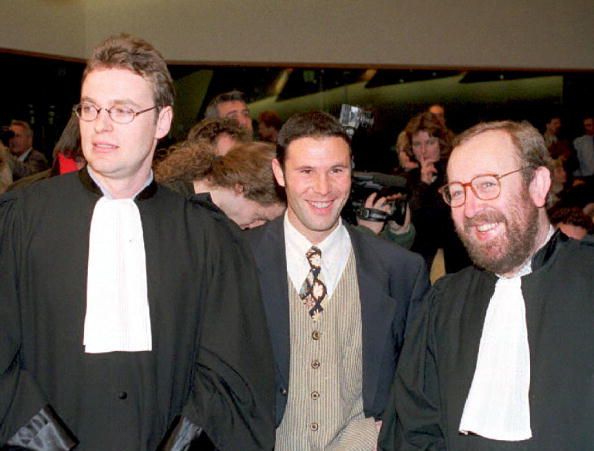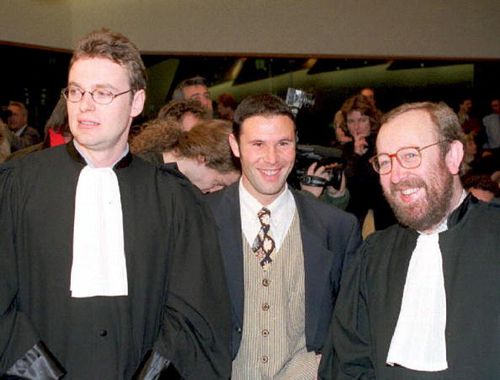
Bosman, Lewandowski and the surge of player power

Jean-Marc Bosman (center) after the ruling
Jean-Marc Bosman is one of those rare footballers whose name will continue to live on in the world of football. However, unlike most such footballers it was his contribution to football off the pitch that makes him stand out and ensures that generations of footballers and fans alike will knowingly or unknowingly pay tribute to the Belgian.
Few changes have made more impact on club football as much as the Bosman Ruling, no mean feat considering how football has evolved since its inception.
Jean-Marc Bosman was a Belgian midfielder who started his career at Standard Liege. After making 86 appearances, he moved to R.F.C. Liege where he stayed till 1990. After his contract expired that year, French side Dunkerque seemed to be his next stop but the clubs couldn’t agree a deal for his transfer.
This seemingly innocuous transfer negotiation resulted in a chain of events whose culmination would ultimately change the face of club football forever. Bosman decided to take matters into his own hands and took his case to the European Court of Justice. On 15th December, 1995 the court ruled in favour of Bosman.
Clubs who could previously demand a transfer fee for players even though their contract had expired now had no say in their new destinations. A player whose contract had expired was considered a free agent and could now join any interested club of his choice.
Players could also agree pre-contracts with other clubs 6 months before the expiry of the present contract. Another aspect of the ruling which would have far reaching consequences was that the cap on “foreign players” in domestic and European competitions was restricted to non EU players.
Overnight the momentum shift in club football was there for all to see. Clubs previously held all the cards. Players who demanded new inflated contracts could be politely shown the door with the club in a position to recuperate their investment in the form of a transfer fee, or price the player out of a move and force him to stay with them. Can you imagine that in the present day where a binding contract has somehow metamorphosed into “slavery”?
At the time of the Bosman ruling, there is definitely an argument to be made for the club having too much power. In hindsight, there was a need to restore the balance between club and player. Change was needed and it was Jean-Marc Bosman who donned the role of Messiah.
Fast forward almost 20 years, and we’re facing the same problems in club football only this time the roles have been dramatically and unequivocally reversed. The Bosman Ruling was supposed to restore order in the battle for power between the club and player. Ironically, the very ruling that was supposed to restore balance has tilted the scales in the direction of the players.
This irony never fails to bring a wry smile to my face when players close to the end of their contracts use the Bosman ruling to engineer a new contract with a hefty raise in wages or plan moves at a slashed price to ply their increasingly expensive trade in newer, greener and more often than not richer pastures. What exactly am I on about, you ask?
Imagine a high profile player is in the last year of his contract. Opposition clubs ever keen to bolster their squads in the search for glory are sure to be circling around like sharks. The player’s club has 3 options in front of them. The first, reward the player with a new contract. This is where the agent comes in. Probably a much maligned one owing mainly to the fact that he is excruciatingly good at his job. His job? Simply to make sure his client (and himself of course) gets the best deal possible by any means. By any means being the operative words.